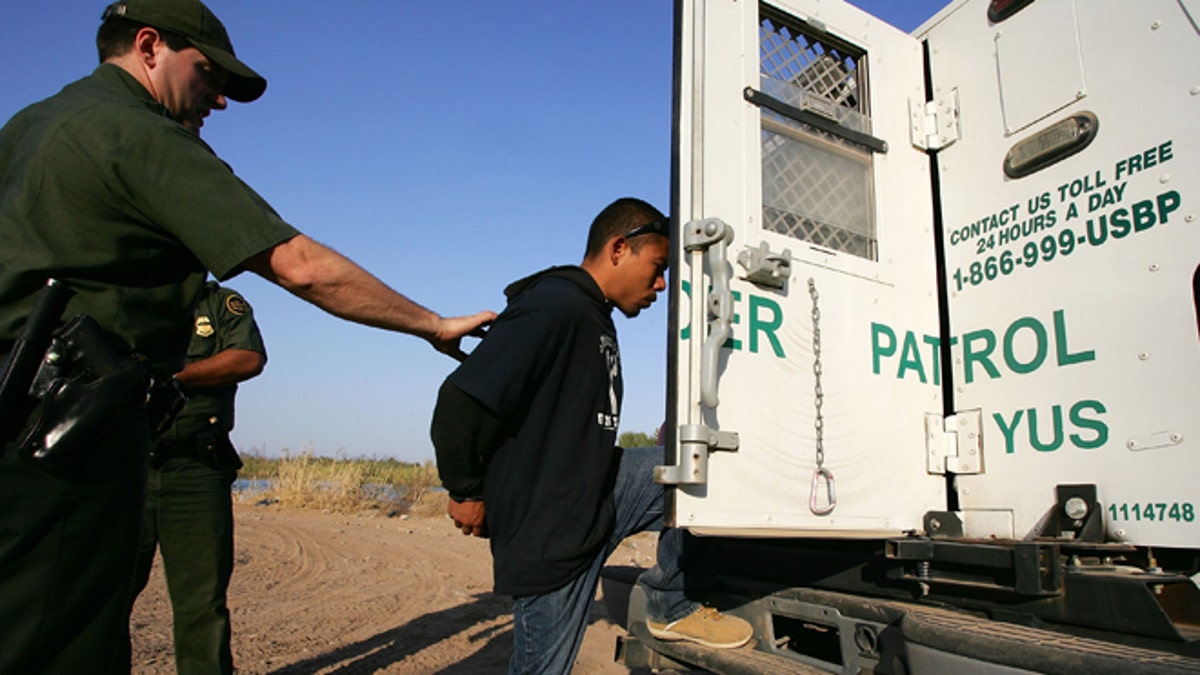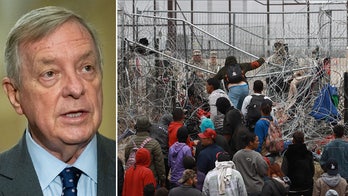
YUMA, AZ - MARCH 17: A suspected illegal immigrant is placed in the back of a U.S. Customs and Border Protection border patrol vehicle after being apprehended on the California side of the Colorado River on March 17, 2006 near Yuma, Arizona. As Congress begins a new battle over immigration policy, U.S. Customs and Border Protection (CBP) border patrol agents in Arizona are struggling to control undocumented immigrants that were pushed into the region by the 1990?s border crack-down in California called Operation Gatekeeper. A recent study by the Pew Hispanic Center using Census Bureau data estimates that the United States currently has an illegal immigrant population of 11.5 million to 12 million, about one-third of them arriving within the past 10 years. More than half are from Mexico. Ironically, beefed-up border patrols and increased security are reportedly having the unintended result of deterring many from returning to their country of origin. (Photo by David McNew/Getty Images) (2006 Getty Images)
For decades Mexico’s cartels have been using underage kids to smuggle drugs across the border and into Arizona’s Cochise County.
It was as simple as scaling the border fence and hauling the contraband into awaiting vehicles. If the teens were caught, they were rarely prosecuted as prosecutors stopped accepting such cases in 1973 under the premise that the county did not have the resources to handle them.
While this is still the case in most other Arizona border counties, prosecutors in Cochise County have decided to crackdown on teen smugglers.
Under a program called Operation Immediate Consequences, prosecutors have charged as adults 51 juveniles – the youngest being 14 – with drug trafficking since last May. Most have accepted a plea bargain and are spending 18 months behind bars.
Before the county started the operation, Border Patrol agents would just confiscate the drugs and ship the kids back to Mexico – only to see them return weeks or even days later.
- Best pix of the week
- At Arizona’s Border Morgue, Bodies Keep Coming
- ICE uncovers 400-yard border tunnel, net 1 ton of marijuana
- ‘Narco Tank’ and Armored Vehicles Added to Cartel Arsenal
- Congressman Steve King: Keep DREAMers Out, They’re Drug Mules
- What If: The Greatest Threat – An Al Qaida-Drug Cartel Alliance
- Children Hired to Work as ‘Mules’ by Mexican Drug Gangs
- How ‘El Chapo’ was recaptured in Los Mochis, Sinaloa
- Clever but Caught!
- Mexican Traffickers Use Minors to Carry Drugs into U.S.
But by charging the teens as adults, the country can now detain them instead of releasing them on probation as they do with other juveniles. The program is mean to deter cartels from using children as drug mules.
Cochise County Attorney Brian McIntyre said the new tactic has come as a rude awakening to many young smugglers.
“Just turn me loose, get it over with," he said the young smugglers used to say before given the bad news, the Los Angeles Times reported. "Then, frankly, the tears start coming.”
So far, only two of the 51 juveniles charged with smuggling have decided not to accept the plea deal.
One of them is 17-year-old Mario Nieblas.
Nieblas admits that he helped smuggle two burlap bags of marijuana into the U.S. and originally accepted the plea deal, but after being assigned a lawyer he rescinded the plea and decided to fight to have his case sent to a juvenile court.
Nieblas’ lawyer Xochitl Orozco argued that his rights were violated in the initial plea.
“They are taking this boy, treating him as an adult, having him sign papers without a lawyer present when he is an underage, unsophisticated Mexican citizen," Orozco told the judge in court last Thursday.
Orozco argue that Nieblas – a middle school dropout who previously worked in a factory in Agua Prieta making $47 a week – did not understand the consequences and should have a chance to rehabilitate his life in a juvenile facility.
"When it takes an entire week just to earn $47, $400 is a much different consideration for someone whose brain is not fully developed yet," Orozco said.
While most of the juveniles charged under the new program are Mexican, some young Americans have also been involved in the program. Prosecutors charged two star players on a local high school baseball team earlier this year, which prompted angry calls from parents.
Their case is still pending and neither has entered a plea.




